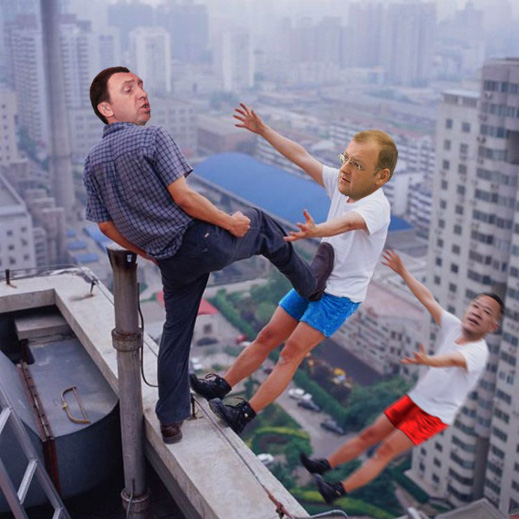
By John Helmer, Moscow
The annual general meeting (AGM) of Rusal shareholders in Hong Kong on Friday removed Anatoly Tikhonov (image centre) from the board of directors, and replaced him with Matthias Warnig. But meeting in virtual secrecy afterwards, the new Rusal board omitted a decision on the chairmanship from its agenda. Despite a press opportunity after the shareholder meeting, the company has issued no announcement of the board change, and has yet to post the new membership of the board or other results of the shareholder votes.
According to sources in Hong Kong, the appointment of the Rusal chairmanship has been postponed. This leaves in place Barry Cheung (right), the interim chairman who was voted into the position on March 16, after Victor Vekselberg had resigned charging chief executive Oleg Deripaska (left) with mismanagement. According to a source from the Rusal meeting yesterday, “probably Cheung will resign himself during the next two or three months in order to give his place [as chairman] to Warnig.”
There is now no Russian on the board who isn’t employed by Deripaska or by one of the minority Russian shareholders. At least two of the four non-Russians on the board designated by Rusal as independents do business with Deripaska on the side; one of them is Cheung. But Cheung has also been an election campaigner for C Y Leung, the new Chief Executive of Hong Kong, who takes power on July 1. Leung’s election was a narrow one, and his mandate is politically weak, with unusual sensitivity to allegations of corruption that were aired during the election campaign. Rusal issued an unusual note of public congratulations to Leung and Cheung on March 23.
Deripaska must take his running orders from Moscow, but he cannot afford to upset Hong Kong and Beijing. Postponing Cheung’s replacement indicates he doesn’t know what exactly to do next. Hong Kong sources report that ahead of yesterday’s AGM and board meetings, Cheung was telling associates he expected to remain on the board, though not as chairman.
Tikhonov has been linked to Deripaska since his days as deputy governor of Krasnoyarsk Krai, after Rusal had forced the owners of the Krasnoyarsk Aluminium Plant (KrAZ) to sell out, under pressure from the regional government, Tikhonov’s predecessors. Tikhonov is currently a senior executive of Vnesheconombank (VEB), and is the representative of state bank creditors on the Rusal board. In March he was ordered by VEB to abstain from voting for Barry Cheung as chairman of the board.
Deripaska, Vekselberg, who controls 15.8% of the Rusal shares (with Len Blavatnik), and Mikhail Prokhorov, who controls 17.02%, went to Putin, then prime minister. He told them that Rusal’s board should be headed by a Russian, and that until the AGM was held, the candidate should be Tikhonov.
Tikhonov reportedly refused to go along with the plan, claiming he was elected by the Rusal shareholders and occupied an independent’s status on the board not apparent to the Kremlin or VEB. According to sources close to the Rusal board, Tikhonov told VEB chief executive, Vladimir Dimtiriev, that he wouldn’t serve as chairman of the board if that crossed Deripaska’s majority; and that he wouldn’t resign if VEB told him to. He reportedly added that only the AGM could remove him in June. That has now happened.
Tikhonov’s listing on the Rusal board has not identified him as an independent, confirming indirectly that he represented the state’s loans to and its shareholding in Rusal. Rusal doesn’t identify stakes controlled by Russian state officials or their organizations in its published shareholder list. Some of these stakes are counted in the bloc attributed to Deripaska through his En+ holding of 47.41%; some are included in the free float of 10.75%. According to the Rusal share sale prospectus, the Russian government took a 3% shareholding at the initial public offering, the largest of the so-called “cornerstone” investors.
Warnig’s nomination was the only public notice Rusal has published of the public shareholder meeting. That was on May 14. Since then the company has disclosed neither the full slate of candidates, nor the result of the AGM vote. The meaning of the Warnig nomination was analysed here.
Sources in Hong Kong report that Deripaska was late in reaching Hong Kong for the AGM and board proceedings; why he was delayed isn’t known. Neither he nor Cheung appeared at the press session after the AGM. Yesterday’s postponement of the customary vote of a newly elected board to designate its new chairman is a sign of internal trouble. The silence of the company, and the lack of authorized leaks to Bloomberg, are a signal that Deripaska is dithering.
Rusal’s share price has traded up and down between HK$4.72 and HK$4.84; in late afternoon trading on Friday in Hong Kong, the share price was HK$4.75 – that is 56% below its initial listing price in January of 2010. At four in the Hong Kong afternoon, someone tried to lift the share price from HK$4.64 to HK$4.87, but the support wasn’t sustainable.











Leave a Reply